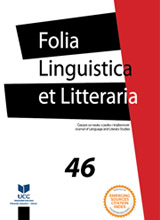RATNI OMLADINSKI ROMANI DUŠANA KOSTIĆA U JUGOSLOVENSKOM I CRNOGORSKOM KONTEKSTU
WAR NOVELS FOR YOUNG ADULTS IN YUGOSLAV AND MONTENEGRIN CONTEXT
Author(s): Svetlana Kalezić-RadonjićSubject(s): Cultural history, Military history, Social history, Montenegrine Literature, Theory of Literature, Sociology of Literature
Published by: Filološki fakultet, Nikšić
Keywords: war novel; young adults; Yugoslav literature; Montenegrin literature; Dusan Kostic;
Summary/Abstract: War literature for children and young adults, especially books which thematizes the World War II, has been an important part of the Yugoslav literary canon for half a century. In my paper, I will try to shed light on its specifics, the wider social context in which it appears, its role in the process of politicization and its particular appearance within Montenegrin youth literature, using the examples of two war novels by the famous Montenegrin writer Dušan Kostić. The theme and overall concept of the war novel for children and young adults fits into the existing context of war prose, but due to its numerous specificities, it forms a separate entity. As it is intended for a special type of readership, it is understood that this type of prose satisfies its horizon of expectations, which is why there are numerous compromises in which the categories of realism and objectivity are most often problematized, while children as the main characters are often clothed in a veil of omnipotence. Most of the writers of this topic for children and young people retain the traditional-realist concept, the step-by-step plot, the omnipresent narrator and the chronological composition in terms of the structure and procedure of the novel. In this context, complexity emerges as a key distinguishing feature between prose for children and prose for adults - while more complex literary procedures have become "domesticated" in literature for adults, literature for children and young adults generally does not abound with examples of more modern literary treatment. Although novels for children with the theme of the National War of Liberation belong to the subgenre of action novels, they nevertheless have some specificities that set them apart from that group to some extent - action and psychological elements are largely interwoven here, which contributes to a more complex novel weaving. The National War of Liberation proved to be a rich source of literary inspiration in Yugoslav literature, which could not be avoided since the topic was imposed based on psychological, but also pragmatic-political, ideological motives. Since the young reader identifies with the main character, for psycho-emotional reasons his death was often unacceptable, which led to many "violent" artistic compromises between what would suit the reader and what was probable. A large number of writers followed the line of overemphasized action, overexposed children's heroism, or black-and-white techniques in character modeling, thus creating literature that painted the war first of all as one big adventure, completely losing sight of its inhuman condition and the dimension of destiny for the sensitive children's psyche. Therefore, most of the works of that period were characterized by an extraordinary similarity, almost a uniformity - they were built according to more or less the same model, with many elements that would mark that type of prose. In works of lower literary quality, children completely obscure the world of adults, as if only they are fighting a war, and any actors from that world are reduced to the role of extras. In the higher quality works on this topic, more trust is shown in young readers and in their ability to understand war as a complex phenomenon. Instead of an idealized hero with a crystal clear moral and ideological profile, a hero with all the attributes of his human mediocrity and imperfection appears more and more often - a being who is beset by doubts and temptations. The discrepancy between quantity and quality is the key feature of the period in which war prose dominated, simply because a large number of works repeated the "already seen" - they did not enhance the novelistic technique, nor the conceptual reflection of war as a phenomenon. One of the purposes of this prose was to establish the young socialist citizen. Kostić's war novels (Gluva pećina, 1956, and Sutjeska, 1958) are distinguished by their quality, and by their atmosphere, subject matter, and how the subject is treated, they belong to young adults’, and not children's literature. Dušan Kostić does not spare his readers, nor does he pander to them, simplify the complex matter by leading them down the path of naive spheres, or write tendentially for them; instead, he uses numerous psychological elements, which is why he can be read equally by various age groups. Kostić most often shows children caught in the whirlwind of war, powerless to resist the storm, but with a strong drive for self-preservation. The author managed to skillfully avoid the manufacture of heroism by focusing on psychological aspects, atypical for this type of children's prose. The epilogues of Kostić's war novels are artistically defined, because even though they do not have happy endings, an ontological optimism shines through them, without which literature for children and young people is unimaginable.
Journal: Folia Linguistica et Litteraria
- Issue Year: 2023
- Issue No: 46
- Page Range: 199-218
- Page Count: 20
- Language: Montenegrine

